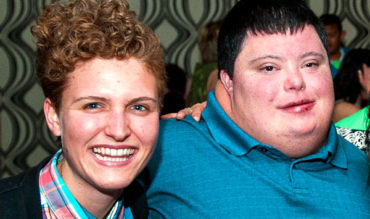Global experts share tips to help empower adults with Down syndrome

Conflicts of power and control commonly emerge in people with Down syndrome in their late 20’s and 30’s— later than their typical peers. While siblings and peers begin hitting transition milestones— like moving out, going to college or work, getting married— adults with Down syndrome may feel stagnant in comparison.
Adults with Down syndrome have dreams and aspirations, both of which are key to their self-esteem and feelings of competency. But, they are often told what to do and when to do it. This is where a growing sense of independence and desire for control for an adult with Down syndrome can collide with prolonged and active parental and caregiver involvement.
While it is wonderful to have supportive and involved parents, caretakers, and employers in a young adult’s life, there are ways these authority figures can exercise power that may undermine an adult’s sense of control. Concretely— this could include managing their schedules, doing things for them they can do for themselves, overseeing social interactions, and controlling their resources like food and money. Conceptually — this could include anything from dictating what is good and appropriate, and shaping values and norms, to making assumptions and biases about adults with capacities and abilities.
While none of these practices are necessarily bad and, in fact, are quite common activities for many parents, teachers, and caretakers, we must remember that adults with Down syndrome are especially vulnerable in this regard because they tend to adhere to rules, be concrete thinkers, and have more limited opportunities to engage with differences. The subtle messages that are sent about their abilities through implicit or explicit actions of the people around them can become internalized and can affect how adults with Down syndrome perceive their own capabilities.
Conflicts of power and control manifest in behavior in three common ways:
1)Defiance and Opposition: Adults with Down syndrome are commonly stereotyped for being stubborn, but in many cases, defiance and opposition is how adults with Down syndrome attempt to exercise some control over their day to day lives. You may also notice the defiance and “no-saying” is not limited to undesirable activities, like chores or work, but it may also extend to include things they enjoy doing. If they are constantly pushed and forced to do these activities they may no longer be enjoyable to the adult.
2)Regulating Pace: When adults with Down syndrome feel like their sense of self-direction is being infringed upon this may manifest in their overall pace. In the absence of power and control the thing they can manage is the speed at which they complete tasks— which sometimes results in extreme slowness and repetitive routines. As a result, rigid behavioral “grooves,” as Dr. Dennis McGuire has described, can develop as a way to maintain a sense of order and control.
3)Self-Talk: Self-talk can be a litmus test for stress and conflict in adults. When adults with Down syndrome are experiencing conflicts of power and control, you may notice their self-talk becomes more frustrated or upset and the frequency of self-talk increases. The adult may become more absorbed in their self-talk and it will be harder to redirect them to other activities. Common self-talk themes when an adult feels powerless can include bossing people around, directing a scene, or acting out the role of a bully, teacher, or parent.
The good news is conflicts of power and control can be prevented and lessened! There are ways to work with a person instead of for a person so that adults with Down syndrome feel empowered and confident. Here are a few strategies to empower adults and reduce power struggles:
- Enhance self-determination by acting with instead of for adults with Down syndrome, which may include allowing them the opportunity to make—and learn from— minor mistakes.
- Include adults with Down syndrome in conversations about their future.
- Utilize tools that shift responsibility to them as much as possible, like cellphone reminders, visual cues, wall calendars, and daily to-do lists.
- Incorporate peer supports and mentors. No one likes to be told what to do by parents all the time!
- Make appointments with your adult w/DS and their support systems (schools, case managers, job sites) to go over Person Centered Planning so that your adult’s wants, goals, and desires are clearly known and are an important part of their considerations.
With proper supports to maintain health and safety, adults with a wide-variety of abilities can succeed with more control and autonomy. Full independence is not a good fit for everyone and that is okay! Look to your adult’s on board strengths and their goals, and work with them to figure out where they need supports built in to maximize their abilities.
ABOUT THE AUTHORS

Bryn Gelaro, LSW, is a consultant for Global’s adult initiatives, including the medical care guidelines for adults with Down syndrome, and a social worker specializing in mental health in adults with Down syndrome.
Dennis McGuire, Ph.D., is a two-time recipient of Global’s Award of Excellence— in Medical Outreach and Psychology— and co-author of Mental Wellness in Adults with Down Syndrome and The Guide to Good Health for Teens and Adults with Down Syndrome.

 Experience our inspirational and groundbreaking videos and photos. Our children and self-advocates are beautiful AND brilliant!
Experience our inspirational and groundbreaking videos and photos. Our children and self-advocates are beautiful AND brilliant! Make sure your local Representatives are on the Congressional Down Syndrome Task Force.
Make sure your local Representatives are on the Congressional Down Syndrome Task Force.